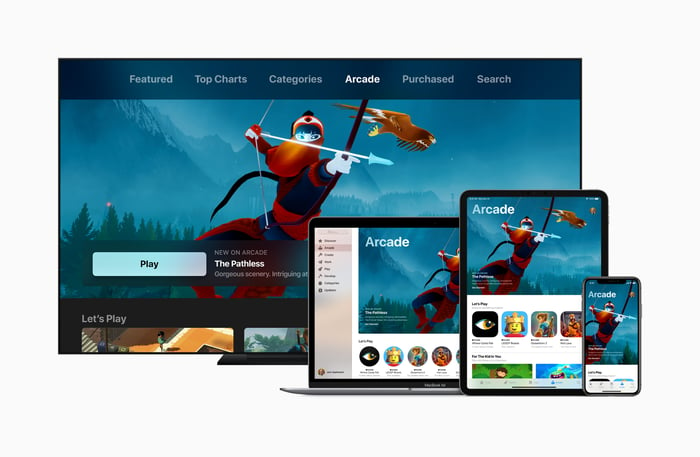Apple (AAPL -0.35%) announced a number of new products at Tuesday's event, including one that could disrupt the gaming industry. Apple Arcade will bring a new subscription gaming model to Apple devices that could be a win-win for gamers and for some developers. It'll level the playing field for small developers who have trouble charging for games and bring a steady stream of revenue.
For big gaming companies like Activision Blizzard (ATVI), Electronic Arts (EA -1.05%), and Take-Two Interactive (TTWO -0.20%), however, the news might not be as positive. They've never had problems charging for games and collectively dominate the gaming industry. This could be a disruption they don't need.

Image source: Apple.
What is Apple Arcade?
Apple Arcade -- due out in the fall -- will be a subscription service that delivers unlimited, ad-free play time in a suite of games. Some of those games will be funded by Apple, and some will be exclusive to the Apple Arcade platform. We don't know how much Apple Arcade will cost, what kind of revenue cut developers will get, or much about titles.
What Apple does appear to be leaning into is the curation of games. "Apple Arcade games will redefine games and be curated based on originality, quality, creativity, fun and their appeal to players of all ages," the company said in a press release.
Selection will happen not only through funding but also through the method in which games are promoted within Apple Arcade. If a game is promoted heavily on the Arcade platform, a game could be a hit, but as can happen in the App Store, it could get buried without the right promotion. Since this is a first of its kind subscription across multiple developers, the way games are promoted will be key to developers.
Check out the latest earnings call transcripts for Apple and other companies we follow.
Apple's play to upend gaming
Apple Arcade has some parallels to the music industry, which Apple played a big role in disrupting two decades ago with the introduction of iTunes. Customers used to buy full albums, which was how most players in the music industry made money. The one-off album purchases provided little predictability for music companies, leading to the boom and bust of small record labels. Then Apple came in and introduced individual song downloads -- and eventually streaming.
Record labels may have been pulled into streaming kicking and screaming, but now customers of companies like Spotify (SPOT 1.11%) and Apple Music's 56 million paying subscribers bring consistent revenue that has driven music industry profits to new heights. Apple Arcade could do the same thing for game developers, who could transition from fighting tooth and nail to build scale on a freemium model to being part of the Apple Arcade ecosystem. The popularity of the game, not tricking customers into buying gems or coins, could drive developer profits, which would be a welcome change.
On mobile devices, Apple Arcade may ultimately be a way to bring more consistent revenue into the gaming industry through things like monthly subscription services. That alone would be a big change to gaming.
Where music and video games diverge
Despite the similarities, there are some key differences between music and video games. Only three companies control about 60% of the music industry's sales today. They hold the keys and the bargaining power with distributors like Spotify and Apple, who would see their subscriptions crippled if one left the service.
Video games are a little different. Activision Blizzard, Electronic Arts, and Take-Two Interactive are the biggest players around, commanding tens of millions of monthly active users on games like Call of Duty, Madden, Grand Theft Auto, and World of Warcraft that build large followings who buy games and upgrades regularly. But they only generated about 35% of the $43 million in video game revenue in 2018 and there are myriad other developers, particularly on new platforms like mobile, who are looking for a way to stand out. In that respect, Apple has a stronger position to build a platform and control the customer relationship rather than developers having that direct path. This could take some of the power away from big game makers.
If the incentive is to use the Apple Arcade platform and not a specific game, it could also reduce the stickiness of hit titles. Right now, the investment to build games is made up front by developers and they make a return on that investment through in-game purchases on hit titles help keep people coming back to games. Their goal is to keep customers in their game ecosystem through engagement and customer investment in time and money into the game. If Apple Arcade becomes the platform and there's no financial investment in each game, that stickiness of each game will be reduced. And the cost of switching to a new game could all but disappear.
The gaming business changes again
Video game makers have seen changes in distribution before, and one of the reasons Activision Blizzard, Electronic Arts, and Take-Two Interactive are as big as they are is because they've navigated the industry's changes successfully. This could be another major shift for game makers and could reduce the need for a gaming PC or console, particularly if there's a cloud computing element, like the one Google recently launched, to improve performance without increasing operating demands on smartphones or tablets.
Until we know more details about Apple Arcade as a service and how consumers use it, it's tough to predict the impact on gaming, but I think we're in for another big round of disruption, with Apple leading the charge.





